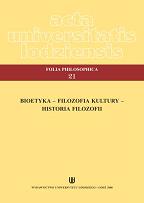Wpływ Kartezjusza na filozofię Locke'a. Problem intuicji
The Influence of Descartes on John Locke's Philosophy. Issue of Intuition
Author(s): Wojciech ZbroszczykSubject(s): Philosophy
Published by: Wydawnictwo Uniwersytetu Łódzkiego
Keywords: Rene Descartes; John Locke; intuition;
Summary/Abstract: There is no doubt as to influence of Descartes on Locke's philosophy. First of all it is a fact of Locke's biografy: issue of intuition appears in Locke's writing after his visiting France in 1675-1679, where probably he had known Descartes' manuscript of "Regulae ad directionem ingenii". Maybe that conception of intuition drew Locke's attention to the issue. There was no mention of intuition in early Draft A (written in 1671). The article shows the resemblance of notion of intuition in Descartes' and Locke's philosophy. Descartes claim that intuition is a distinguished state of mind. This state has pure intellectual character. It has nothing to do with divine illumination. It is one straight, directly mental action. For Locke the intuition is the perception of the certain agreement or disagreement of two ideas immediately compared together. Both thinkers compare intuition to the light. But Descartes distinguishes that state of mind and for Locke it is just one of many human faculties. Descartes and Locke consider that intuition is certain beyond all doubt, needs no probation, and this is the highest of all human certainty. Even where Locke seems to have taken over the idea of intuition of Descartes, it will be found that he has imposed his own interpretation upon it.
Journal: Acta Universitatis Lodziensis. Folia Philosophica. Ethica - Aesthetica - Practica
- Issue Year: 2008
- Issue No: 21
- Page Range: 131-144
- Page Count: 14
- Language: Polish

